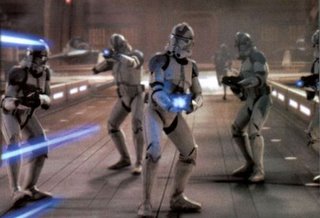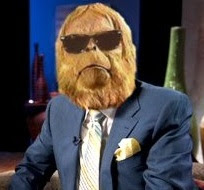Monday, November 07, 2005
Overview of Lesson Plan:


In this lesson, you will evaluate how the movie industry depicts heroes, villains, and events, and how these characters and plots relate to the society and time period in which the films are created. You will also maintain a week-long viewing log of television shows and movies, noting how heroes and villains are characterized based on race, ethnicity, gender, age, and actions.
Objectives:
Students will:
1. Write a journal response discussing definitions and examples
about the Epic Tales, of iconic Heroes (good) and Villains (bad)
2. Assess the role of films and other media in representing real events and the influences of the society on the topics and characterizations in movies.
3. Watch and discuss "Star Wars Episode III: Revenge of the Sith."
4. Maintain a viewing log of television shows and movies over the course of a week, noting how heroes and villains are characterized based on race, ethnicity, gender, age, and actions.
Activities / Procedures:

WARM-UP: In their journals, students respond to the following questions :
"How would you define the balance between good vs. evil? "
What types of people are typically seduced by temptation to do bad things?
What examples of wrong doings can you think of in the course of United States or world history?"
Students share their responses, and the teacher writes responses on the board.
1.Discuss how and why student responses differed.
2. Discuss whether or not movies are a good source for accurate information about history, society, and current events.
--In what ways do movies reflect society (both in topic and in values demonstrated)?
--What responsibilities, if any, do filmmakers have in presenting movies based on factual events?
--What examples of films in recent years were based on real events (either as works of non-fiction or as loosely-related accounts of events), and how did they succeed or fail in presenting the facts accurately and in a realistic way?
--How can movie viewers discern fact from fiction in movies? --What groups of people may have been represented as the bad guys in American movies in each decade from the 1930s to the 1990s? How did those media representations possibly reflect world events in those eras and who was viewed as evil or villainous?
Students discuss "Star Wars Episode III:
Revenge of the Sith," focusing on the following article :


George Lucas recently revealed that he patterned his story after historical transformations from freedom to fascism, never figuring when he started his prequel trilogy in the late 1990s that current events might parallel his space fantasy. "As you go through history, I didn't think it was going to get quite this close. So it's just one of those recurring things," Lucas said at a Cannes news conference. "I hope this doesn't come true in our country. "Maybe the film will waken people to the situation," Lucas joked. That comment echoes Michael Moore's rhetoric at Cannes last year, when his anti-Bush documentary "Fahrenheit 9/11" won the festival's top honor.
Unlike Moore, whose Cannes visit came off like an anybody-but-Bush campaign stop, Lucas never mentioned the president by name but was eager to speak his mind on U.S. policy in Iraq, careful again to note that he created the story long before the Bush-led occupation there. "When I wrote it, Iraq didn't exist," Lucas said, laughing. "We were just funding Saddam Hussein and giving him weapons of mass destruction. We didn't think of him as an enemy at that time. We were going after Iran and using him as our surrogate, just as we were doing in Vietnam. ... The parallels between what we did in Vietnam and what we're doing in Iraq now are unbelievable." The prequel trilogy is based on a back-story outline Lucas created in the mid-1970s for the original three "Star Wars" movies, so the themes percolated out of the Vietnam War and the Nixon-Watergate era, he said. Lucas began researching how democracies can turn into dictatorships with full consent of the electorate. In ancient Rome, "why did the senate after killing Caesar turn around and give the government to his nephew?" Lucas said. "Why did France after they got rid of the king and that whole system turn around and give it to Napoleon? It's the same thing with Germany and Hitler. "You sort of see these recurring themes where a democracy turns itself into a dictatorship, and it always seems to happen kind of in the same way, with the same kinds of issues, and threats from the outside, needing more control. A democratic body, a senate, not being able to function properly because everybody's squabbling, there's corruption."
Star Wars Mirrors U.S. Imperialism

"This is how liberty dies -- to thunderous applause."So observes Queen Amidala of Naboo as the galactic senate grants dictator-to-be Palpatine sweeping new powers in his crusade against the Jedi in the final "Star Wars" film. It's just one of several lines in "Star Wars: Episode III -- Revenge of the Sith," that reveal the movie to be more than just a sci-fi blockbuster and gargantuan cultural phenomenon."Revenge of the Sith," it turns out, can also be seen as a cautionary tale for our time -- a blistering critique of the war in Iraq, a reminder of how democracies can give up their freedoms too easily, and an admonition about the seduction of good people by absolute power. Some film critics suggest it could be the biggest anti-Bush Administration blockbuster since "Fahrenheit 9/11."New York Times movie critic
A.O. Scott gives "Sith" a rave, and notes that Lucas "grounds it in a cogent and (for the first time) comprehensible political context. Agence France Presse reports that the movie delivers "a galactic jab to US President George W. Bush."It's been generating "murmurs at the parallels being drawn between Bush's administration and the birth of the space opera's evil Empire."Are some people reading too much into the movie?Filmmaker George Lucas insists that the genesis of his story dates back 30 years. But he pointed out that certain themes do seem to repeat themselves, whether here and now or a long time ago in a galaxy far, far away.
Harlan Jacobson writes in USA Today: "Since screenings began at Lucas' Skywalker Ranch, people have been discussing parallels between the final film in Lucas' six-film Star Wars saga and current political events.
"Lucas said Darth Vader's saga is about how a good man turns himself into a bad one." 'Most of them think they're good people doing what they do for a good reason.'
"Marijke Rowland writes in the Modesto Bee: "Lucas' longtime producer Rick McCallum insists that the resemblances are coincidental." '(The film) was started well before we even knew this disaster was going to happen,' he said, referring to Iraq war. "Scottish actor Ian McDiarmid, who plays the evil mastermind Chancellor Palpatine, who installs himself as emperor, said the film manages to reflect modern events while addressing timeless themes." 'It is a film about how easily (freedom) can disappear, how easily we can all be seduced into surrendering it while thinking we're having a good time,' he said. 'It chimes with the zeitgeist.' Adds McDiarmid: "It's a film that reflects contemporary events, but it is a film. Enjoy the metaphor."


In this lesson, you will evaluate how the movie industry depicts heroes, villains, and events, and how these characters and plots relate to the society and time period in which the films are created. You will also maintain a week-long viewing log of television shows and movies, noting how heroes and villains are characterized based on race, ethnicity, gender, age, and actions.
Objectives:
Students will:
1. Write a journal response discussing definitions and examples
about the Epic Tales, of iconic Heroes (good) and Villains (bad)
2. Assess the role of films and other media in representing real events and the influences of the society on the topics and characterizations in movies.
3. Watch and discuss "Star Wars Episode III: Revenge of the Sith."
4. Maintain a viewing log of television shows and movies over the course of a week, noting how heroes and villains are characterized based on race, ethnicity, gender, age, and actions.
Activities / Procedures:

WARM-UP: In their journals, students respond to the following questions :
"How would you define the balance between good vs. evil? "
What types of people are typically seduced by temptation to do bad things?
What examples of wrong doings can you think of in the course of United States or world history?"
Students share their responses, and the teacher writes responses on the board.
1.Discuss how and why student responses differed.
2. Discuss whether or not movies are a good source for accurate information about history, society, and current events.
--In what ways do movies reflect society (both in topic and in values demonstrated)?
--What responsibilities, if any, do filmmakers have in presenting movies based on factual events?
--What examples of films in recent years were based on real events (either as works of non-fiction or as loosely-related accounts of events), and how did they succeed or fail in presenting the facts accurately and in a realistic way?
--How can movie viewers discern fact from fiction in movies? --What groups of people may have been represented as the bad guys in American movies in each decade from the 1930s to the 1990s? How did those media representations possibly reflect world events in those eras and who was viewed as evil or villainous?
Students discuss "Star Wars Episode III:
Revenge of the Sith," focusing on the following article :


George Lucas recently revealed that he patterned his story after historical transformations from freedom to fascism, never figuring when he started his prequel trilogy in the late 1990s that current events might parallel his space fantasy. "As you go through history, I didn't think it was going to get quite this close. So it's just one of those recurring things," Lucas said at a Cannes news conference. "I hope this doesn't come true in our country. "Maybe the film will waken people to the situation," Lucas joked. That comment echoes Michael Moore's rhetoric at Cannes last year, when his anti-Bush documentary "Fahrenheit 9/11" won the festival's top honor.
Unlike Moore, whose Cannes visit came off like an anybody-but-Bush campaign stop, Lucas never mentioned the president by name but was eager to speak his mind on U.S. policy in Iraq, careful again to note that he created the story long before the Bush-led occupation there. "When I wrote it, Iraq didn't exist," Lucas said, laughing. "We were just funding Saddam Hussein and giving him weapons of mass destruction. We didn't think of him as an enemy at that time. We were going after Iran and using him as our surrogate, just as we were doing in Vietnam. ... The parallels between what we did in Vietnam and what we're doing in Iraq now are unbelievable." The prequel trilogy is based on a back-story outline Lucas created in the mid-1970s for the original three "Star Wars" movies, so the themes percolated out of the Vietnam War and the Nixon-Watergate era, he said. Lucas began researching how democracies can turn into dictatorships with full consent of the electorate. In ancient Rome, "why did the senate after killing Caesar turn around and give the government to his nephew?" Lucas said. "Why did France after they got rid of the king and that whole system turn around and give it to Napoleon? It's the same thing with Germany and Hitler. "You sort of see these recurring themes where a democracy turns itself into a dictatorship, and it always seems to happen kind of in the same way, with the same kinds of issues, and threats from the outside, needing more control. A democratic body, a senate, not being able to function properly because everybody's squabbling, there's corruption."
Star Wars Mirrors U.S. Imperialism

"This is how liberty dies -- to thunderous applause."So observes Queen Amidala of Naboo as the galactic senate grants dictator-to-be Palpatine sweeping new powers in his crusade against the Jedi in the final "Star Wars" film. It's just one of several lines in "Star Wars: Episode III -- Revenge of the Sith," that reveal the movie to be more than just a sci-fi blockbuster and gargantuan cultural phenomenon."Revenge of the Sith," it turns out, can also be seen as a cautionary tale for our time -- a blistering critique of the war in Iraq, a reminder of how democracies can give up their freedoms too easily, and an admonition about the seduction of good people by absolute power. Some film critics suggest it could be the biggest anti-Bush Administration blockbuster since "Fahrenheit 9/11."New York Times movie critic
A.O. Scott gives "Sith" a rave, and notes that Lucas "grounds it in a cogent and (for the first time) comprehensible political context. Agence France Presse reports that the movie delivers "a galactic jab to US President George W. Bush."It's been generating "murmurs at the parallels being drawn between Bush's administration and the birth of the space opera's evil Empire."Are some people reading too much into the movie?Filmmaker George Lucas insists that the genesis of his story dates back 30 years. But he pointed out that certain themes do seem to repeat themselves, whether here and now or a long time ago in a galaxy far, far away.
Harlan Jacobson writes in USA Today: "Since screenings began at Lucas' Skywalker Ranch, people have been discussing parallels between the final film in Lucas' six-film Star Wars saga and current political events.
"Lucas said Darth Vader's saga is about how a good man turns himself into a bad one." 'Most of them think they're good people doing what they do for a good reason.'
"Marijke Rowland writes in the Modesto Bee: "Lucas' longtime producer Rick McCallum insists that the resemblances are coincidental." '(The film) was started well before we even knew this disaster was going to happen,' he said, referring to Iraq war. "Scottish actor Ian McDiarmid, who plays the evil mastermind Chancellor Palpatine, who installs himself as emperor, said the film manages to reflect modern events while addressing timeless themes." 'It is a film about how easily (freedom) can disappear, how easily we can all be seduced into surrendering it while thinking we're having a good time,' he said. 'It chimes with the zeitgeist.' Adds McDiarmid: "It's a film that reflects contemporary events, but it is a film. Enjoy the metaphor."

